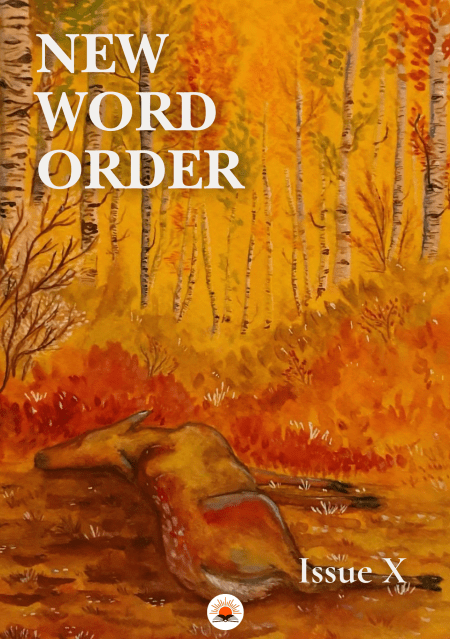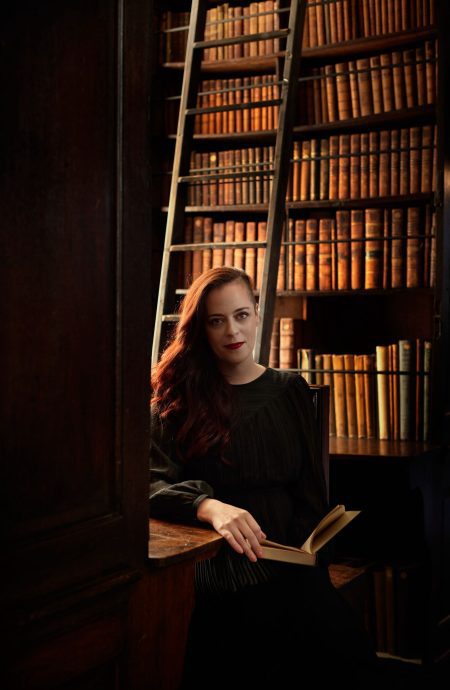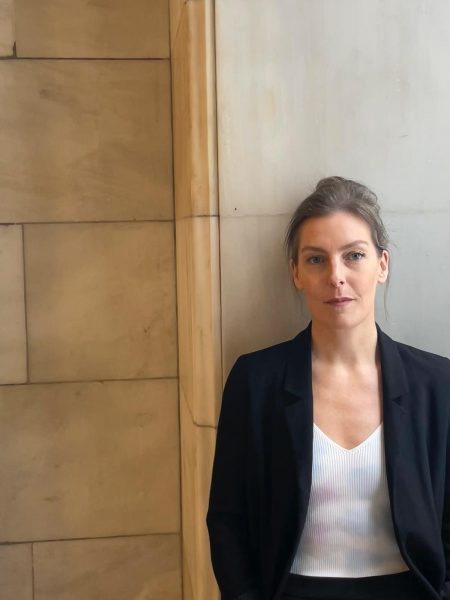written by Chris Tiernan. Chris (he/him) grew up in Shankill and is Irish-Filipino. After attending Creative Writing at Inchicore College, he is in his second year of English with Creative Writing at UCD. Inspired by Raymond Carver, his short stories explore themes of emotional distance and communication failure, while in his non-fiction he delves into addiction and alienation. He has a passion for collecting typewriters.
I discover the first letter because of Ellen’s purse. Although I wouldn’t call it a purse, more like a large bag. Whenever she looks for something, she buries both hands into what looks like the void, rummaging through the innumerable items – pens; empty pouches of tobacco; plastic grinders; loose change; broken lighters; sticks of gum; damp paperbacks; and cosmetics.
After dinner and a movie at The Stella Theatre, we go back to her apartment. The doorman gives me a knowing smile. We sway in the elevator and stumble arm-in-arm towards her door. We are flushed from the meal, drinks, the walk back and a sense of romantic expectation.
She reaches into the bag to look for the key. After probing through the mess in her purse, she finally pulls out a key and inserts it into the lock, but it is the wrong key. After this, she drops the bag onto the floor and gets down on her knees. She smiles at me and reaches back into the bag. This is when she draws out a frayed white envelope with a doodle of a heart in blue biro.
“Oh yeah,” she says. “This is what I was telling you about. From my sister in San Francisco.” She suggests I read it while she looks for the key.
I take the envelope from her, and she swings back around to grab her purse with an almost adorable ferocity. She turns it upside down and empties everything onto the floor. Her disorganisation and her inability to find things drive me crazy. When we first met, I was amused by it, but now it has evolved into exasperation.
I have no intention of reading it, but when I take it out of the envelope, I realise she has given me the wrong letter. Instead of her sister, I have a letter from her former professor Dr Burroughs. Ellen has told me about this man before. She was his favourite student, and he was her favourite teacher.
She had told me that Dr Burroughs had moved to Zermatt, Switzerland to teach full-time, but now I learn he has retired. As I read on, something more interesting catches my attention.
‘Ell, I cannot forget about our last sauna together. The way you tied me up and hit me with those gigantic willow branches has left an indelible impression on my memory. I know you think I’m too old for you, and I realise my paralysis is increasing rapidly – admittedly, I am dictating this letter to my valet, but I don’t have long to live, and I can’t bear the thought of living my last days without you. Ell, I want you to know that I’m prepared to leave you my house in Kerry. And more. Whether or not you come to me, I’ll leave it all to you.’
I slowly fold up the letter, put it back into the envelope and return it to her without comment. She is still on all fours with the contents of her life scattered all around her.
That night we make love. In the morning, we only talk about what movie to see.
***
Ellen will lose many things in the space of a couple of weeks, flimsy corner shop umbrellas or cheap scarves she finds in charity shops. But if there is one thing that infuriates me the most, it’s the gloves because they’re not just any gloves. In contrast to all the other items, it is always an expensive pair made from sleek lambskin with a soft, red velvet internal lining.
So, the following night we decide on Villeneuve’s DUNE. I book our seats in the middle row. We settle ourselves, – the trailers are already over, the film’s about to begin, and everyone is quieting down but Ellen begins to squirm. First, she darts her head to the right, then to the left. She leans over to me and whispers, “I think I lost another glove.”
“Well let’s look for it after the movie,” I whisper.
“I don’t know where it is. I can’t find it. I know I had it with me when we came in.”
She stands up and looks down at where she’s sitting. Then she asks me to stand up for a moment, gently pushing me forward so she can look at my seat. I hate this. I want to watch the movie and avoid making a spectacle of myself.
“Don’t worry. I guarantee you it will be in the same place when the lights come up and the movie is over.”
Shaking her head, she doesn’t seem to understand me. It is like she has this irrational fear that the longer the film goes on, this glove will get further away from her as if some unseen hand, from some unseen force, is separating her from this item with every passing minute.
She noisily searches through her purse, dropping some things onto the floor in the process. When that provides no results, she goes through her coat, and then she looks through my coat. She asks the people in the next row if they’ve seen her glove. I know everyone is bothered by us, but they try to be polite, and say, “No, we haven’t, sorry.” By this point the heat in my ears is excruciating.
“I’m just going to turn on my phone and use the flashlight,” she says.
The nuisance of turning on a flashlight in the middle of a film is obvious, but I just say to her, “Your phone will play a loud start-up sound once you turn it on.”
“Look, Mark, I don’t want to lose another glove. I have lost too many already.”
Even though it’s dark, I can tell she is just as embarrassed about this whole situation as I am. She starts to clumsily brush past the people next to us. I watch her storm down the stairs, and my eyes continue to follow this tall, slender, black silhouette marching under and across the gigantic screen. Her heels aggressively echo throughout the theatre. I decide against chasing after her.
Further into the film, I reach under my chair and make a half-hearted attempt to find this damn glove. My fingers graze across scattered bits of popcorn before I finally feel smooth leather. There is something stuck to the glove – a folded-up piece of paper. It’s another letter from Dr Burroughs.
I choose to read it during the desert scenes when the theatre is filled with light. What strikes me is, it is dated from only a few months ago. Again, he goes on about their nights of passion together.
‘Ell, that night you brought a smile upon my face the likes I haven’t worn for many years. Wheeling me around the driveway of the chalet after cocktails was a good laugh, but what solidified everything for me was your earnest spontaneity. Watching you burst out into the garden and dance naked in the snow whilst Chet Baker sang to us about falling in love too easily…Ell, it was everything to me.’
I think I know the night Dr Burroughs is talking about. After what she told me was a weekend away to Switzerland for a literature festival, she spoke to me of her newfound obsession with Chet Baker and his ‘delicious’ voice.
I drop the glove down the side of my seat, and sit in the theatre, blindly staring at the screen.
***
It’s the week of our anniversary. We have a date on the weekend, but tonight, friends of ours have booked us a table at a classy Italian restaurant called Rosa Madre. I arrive at Ellen’s apartment one hour early. I bring a bottle of Woodford Reserve bourbon – our favourite, a bouquet of peonies and a vintage hardback of Anaïs Nin’s Delta of Venus. I ring the doorbell, and Ellen greets me in a pair of pink tracksuit bottoms and the Velvet Underground t-shirt I gave to her. The place is a mess. Clothes are strewn all over, and her next-door neighbour Maria is there. Last year, after a string of nervous breakdowns, her husband left her in the middle of the night. She fears he may have killed himself.
Trying to be a good neighbour, Ellen listens to Maria’s wrenching accounts of misery and loneliness. But finally, Maria leaves, and Ellen goes into the bathroom. She calls out to me: “There are some of those clear ice balls you like in the freezer. Go make yourself a drink.” She turns on the shower. I hear her singing to herself.
I gulp down some of the bourbon as I pace back and forth impatiently. Ellen takes inordinately long showers. I peruse her apartment, picking up old sweaters and folding them into a pile. I get tired of this, and I make another drink.
I start doing laps around her bedroom before I notice a dusty old book on her nightstand. I pick it up with bored curiosity. It is a copy of Henry Miller’s Tropic of Cancer. I can’t say I have any genuine interest in it, but then I notice a folded-up piece of paper being used as a bookmark. Immediately, I recognise the postmark, and also the handwriting – Love From Switzerland.
Somewhat reluctantly, I am drawn to read this third letter. I toss the book onto her bed and unfold it hurriedly. This time, there is a sketch of a crippled man and a younger woman entwined in a highly suggestive, complex embrace. Written underneath is the following:
‘Death waits for me, but Switzerland waits for you. Counting down the days until your arrival. The excitement prevents me from sleeping. Despite the fibrillations and the spreading tumours, my doctor assures me I’m still functional. I am ready for the long sleep. So kiss me goodnight.’
I slip the letter back into a random page. Then the landline rings. I pick it up, and it’s Ellen’s mother calling from Belfast. She’s upset and in tears. Ellen’s younger brother Matthew is in trouble again.
I say, “Okay, hold on Cheryl. I’ll get her. One second.”
“I’ll be right out,” Ellen says.
She turns off the water, puts on a robe and sits down on the bed to talk with her mother. Here’s the problem with Matthew – he’s a compulsive voyeur with a history of sex addiction, and now he has been arrested for sneaking into the ladies’ room of the Clayton Hotel.
I am taken aback by this. I suddenly remember when Ellen and I started dating, she wanted me to tell her exactly when I’d be arriving at her building so she could stand in the window and undress slowly, letting me watch her from down in the alley. I admit, I found this kind of stuff profoundly arousing.
But now I wonder if Ellen encouraged this form of behaviour in her brother. I conclude that this thought isn’t something I want to pursue, especially with a stomach full of whiskey. Besides, we’re already late and I’m growing more and more agitated. I remind her we have a dinner party to get to, and eventually she hangs up.
Finally, after getting changed and putting on makeup, she puts on a silver earring, but she can’t find the other one and starts looking for it all over the apartment.
“I’m going to call and warn them we’ll be late,” I say.
“Fine Mark. Go ahead.” She says.
“Well, please hurry up,” I say.
“What difference does it make,” she says. “They don’t serve dinner the minute everyone arrives.”
“Ellen, I’m just–”
“When they say 7:30, they don’t really mean 7:30.” She is still running around the apartment. She knocks over the piles of clothes I created. “Why are you being so uptight lately? And why do you have to be the first one at a party? You know you’ll have nobody to talk to.” She grabs her cigarette case from the nightstand and lights this thin cigarette, then she leans against her windowsill. “And anyway, it’s polite not to come too soon.”
And I say, “There is no way we can get there early, I’ll tell you that much.”
She gives up on the earrings and now she’s dressed and made up. We are stepping out into the corridor and closing the door when the phone starts to ring again.
“Forget it,” I say.
“It’ll just take a second.”
“For god’s sake Ellen, we’re forty-five minutes late. We’re going to miss dinner. Your answering machine will get it.”
“It’s been malfunctioning. I have to get it fixed. Look, you go on ahead then.”
I see no point in leaving alone for the party just to save two minutes. She goes back into the apartment, and I stand in the doorway because I’m afraid that if I don’t continue to make it clear we’re in a hurry, we’ll never get out.
I watch her pick up the phone. “Yes? Yes, it is.” She sits on the bed, putting her head in her hand, listening quietly.
“What happened?” I say.
“My old mentor. Dr Burroughs. He just died. His assistant asked me to attend the funeral.”
I lie to her and say, “I didn’t know you were that close.”
“Come in. Close the door.”
I sit down beside her. She brings over an ashtray and two cigarettes. I find that I am no longer worrying about the dinner party, about our anniversary. It doesn’t matter. There are a lot of things that don’t matter now.
“Talk to me,” I say.
“Well, we worked on a major research project in the Sahara. Richard, Dr Burroughs, I mean, we worked very closely, studying the impacts of climate change on the desert’s ecosystem. We would analyse pattern shifts in the dunes using satellite imagery and ground-based observations, things like that. About halfway through the project, I was bitten by a scorpion. I was delirious, but Richard never left my side. He was there to change my dressing and give me alcohol rubdowns. Mark, I don’t just owe him my intellectual development. I owe him my life.”
I know she’s leaving out one profound aspect of the story. “How did you stay in touch for so long?”
“We started writing to each other once he went back to London.”
“How often?”
“Why does that matter?”
“Sorry.”
“Oh, I don’t know Mark. Maybe every six months or so.”
She takes a long drag from her cigarette, blowing smoke out through her nostrils. “Listen, I have to go. I have to go to the funeral. But I need you with me.”
The situation fascinates me. I have been reading this man’s love letters for weeks now, and yet I still can’t believe it when I say, “Of course, I’ll come if you want me to.”
Image: Mountain Road by Robin Mentel. Robin is a passionate photographer with a special fondness for wildlife, abstract, and portrait photography but loves to try out all the different flavours of the field. The camera sees the world very differently than how we perceive the world; Robin tries to reach beyond that and show the world in alien ways that we are not used to.



